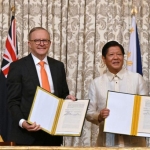
The South China Sea is a strategic and disputed waterway, where China, the Philippines, Vietnam, Malaysia, Brunei, and Taiwan have overlapping territorial and maritime claims. The sea is rich in natural resources, such as fish, oil, and gas, and is also a vital route for international trade and commerce.
China claims almost the entire South China Sea, based on its historical rights and the so-called nine-dash line, which was rejected by an international tribunal in 2016. China has also built and militarized artificial islands and reefs in the sea, raising concerns about its intentions and actions.
The Philippines, which has a long-standing alliance with the United States, has been one of the most vocal critics of China’s claims and activities in the South China Sea. The Philippines won a landmark case against China in 2016, but has since adopted a more conciliatory approach under President Ferdinand Marcos Jnr, who has sought closer economic and diplomatic ties with China.
The statement
In a speech at the Lowy Institute in Melbourne, Australia, in March 2024, Marcos Jnr said that he was prepared to work with China on the challenges in the South China Sea through formal channels, in part because of their countries’ shared “Chinese DNA”. He said that the Philippines and China had a long history of trade and cultural exchange, and that many Filipinos had Chinese ancestry, including his own family.
“If we are to examine DNA, there are very few Filipinos with no Chinese DNA. My family actually makes much of the fact that we have, within our family tree, an infamous Chinese pirate who used to operate within the waters of the then South China Sea. That cannot be discounted,” he said.
He also said that he would not mind if the Philippines returned to harmony with China, and that he respected China as an important neighbor and partner. However, he also reiterated that the Philippines would not surrender “a square inch” of its maritime sovereignty, and that it would continue to upgrade its coast guard and armed forces.
Keep Reading
The analysis
Marcos Jnr’s statement reflects his pragmatic and nuanced approach to the South China Sea issue, which balances the Philippines’ national interests, regional stability, and international relations. His statement also reveals his awareness and appreciation of the historical and cultural ties between the Philippines and China, which could serve as a basis for dialogue and cooperation.
However, his statement also risks alienating and offending some of his domestic and foreign audiences, who may view his reference to the “Chinese DNA” as a sign of weakness, appeasement, or betrayal. His statement also contradicts his earlier stance of being tough and assertive against China, which he expressed during his presidential campaign and his first year in office.
Therefore, Marcos Jnr’s statement could be seen as either a blessing or a curse in the South China Sea, depending on the perspective and interests of the parties involved. It could be seen as a blessing, as it could pave the way for a peaceful and constructive resolution of the dispute, or as a curse, as it could undermine the credibility and legitimacy of the Philippines’ position and claims.



























